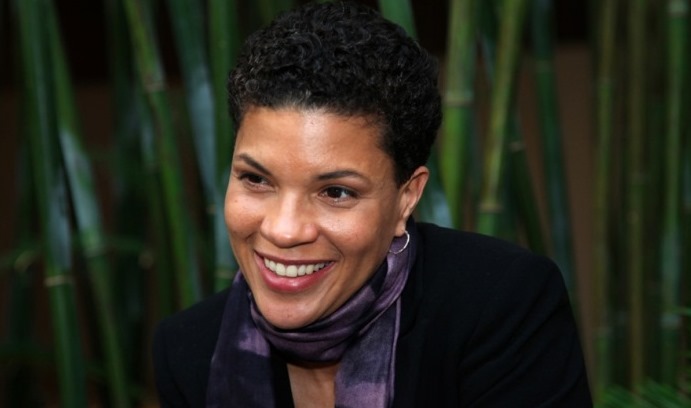“New Jim Crow” author to keynote MLK celebration

Michelle Alexander says American citizens of color are disproportionately labeled as “criminals.”
Michelle Alexander, the New York Times best-selling author of The New Jim Crow: Mass Incarceration in the Age of Colorblindness, will deliver the keynote address for the university’s yearlong celebration of the life and legacy of the Rev. Dr. Martin Luther King Jr., the slain civil rights leader.
Her free public lecture will begin at 7 p.m. Wednesday, Jan. 28, in Baker Hall of the Zoellner Arts Center.
Alexander, a highly acclaimed civil rights lawyer, advocate and legal scholar, holds a joint appointment at the Kirwan Institute for the Study of Race and Ethnicity and the Moritz College of Law at The Ohio State University. Prior to joining the Kirwan Institute, Alexander was an associate professor of law at Stanford Law School, where she directed the Civil Rights Clinics.
In 2005, she won a Soros Justice Fellowship, which supported the writing of her first book, The New Jim Crow, which was published in 2010 to rave reviews. It held a spot on the New York Times best-seller list for 10 consecutive months, and was hailed by American philosopher, academic and activist Cornel West as a “secular bible for a new social movement in early twenty-first-century America.”
In examining race-related social, political and legal issues in the U.S., Alexander argues that although the original Jim Crow has been relegated to the country’s dark past, the essential structure of U.S. society remains unaltered. People of color are disproportionately labeled as “criminals,” paving the way for legal, institutionalized discriminatory structures and practices in employment, housing, voting rights and other public benefits accorded to whites.
Alexander’s research and her book have been featured in national radio and television media outlets, including NPR, The Bill Moyers Journal, the Tavis Smiley Show and C-Span Washington Journal, among others.
For several years, Alexander served as the director of the Racial Justice Project for the American Civil Liberties Union of Northern California, where she helped lead a national campaign against racial profiling by law enforcement. While an associate at the Oakland, Calif., law firm of Saperstein, Goldstein, Demchak & Baller, she specialized in plaintiff-side class-action lawsuits alleging race and gender discrimination.
Alexander is a graduate of Stanford Law School and Vanderbilt University. Following law school, she clerked for Justice Harry A. Blackmun on the United States Supreme Court, and for Chief Judge Abner Mikva on the United States Court of Appeals for the D.C. Circuit.
A timely topic
MLK planning committee co-chairs Lloyd Steffen, professor of religion studies and university chaplain, and Tyrone Russell, director of Lehigh’s Office of Multicultural Affairs, say the focus of Alexander’s work could not be more timely, given events across the country that showcase the racial disparity in the treatment of individuals accused of a crime.
Alexander recently wrote a personal perspective on these issues in an op-ed in The New York Times.
“The significance of Michelle Alexander’s work has been noted by academics and intellectuals stunned by her indictment of the war on drugs and outraged at the system of racial control that is destroying black communities while creating an inescapable underclass based on race,” Steffen said.
“But the deeper impact of her work is to be found in the fact that prosecutors and judges and many who work in the criminal justice system are finding Alexander’s analysis a recognizable and truthful portrayal of how incidents with names—Trevon Martin, Michael Brown and Eric Garner—are part of a greater and more tragic racial dynamic in the United States, one we have yet to confront fully in our national life.
“Alexander’s work is invaluable for thinking constructively about America’s racial future. We look forward to her visit and the impact she will undoubtedly have on our community.”
Russell said that Alexander’s keynote address, which has been two years in the making, will continue to “shed light on the injustices within our very own justice system.”
He said he hopes that faculty, staff and students will take advantage of several book discussions leading up to the Jan. 28 event. More information on those events can be found here.
“It’s our hope that people in the Lehigh community understand that we are not immune to the ills that plague our society,” he added. “These are important discussions to have.”
A continued focus on social justice
Alexander’s talk is one of several programs organized by the university’s MLK Committee, which expanded programming last year and this year to span the entire academic year. This second year of robust programming continues a focus on social justice issues, particularly focusing on the prison industrial complex as part of the larger theme of “Incarcerated Justice.”
Earlier events this year included a talk by Jasmine Rand, the attorney who represented the family of slain Florida teen Trayvon Martin family, and a panel discussion that featured Martin’s mother, Sabrina Fulton.
In early November, Lehigh hosted academics Phillip A. Goff, associate professor of social psychology at the University of California-Los Angeles, and the co-founder and president for research for the Center for Policing Equity at UCLA; and Carl Hart, associate professor at Columbia University and author of the recently published High Price: A Neuroscientist's Journey of Self-Discovery That Challenges Everything You Know About Drugs and Society.
Their talks focused on “The Price We Pay: Crack, Cops and Cost of Bias.”
Posted on:

